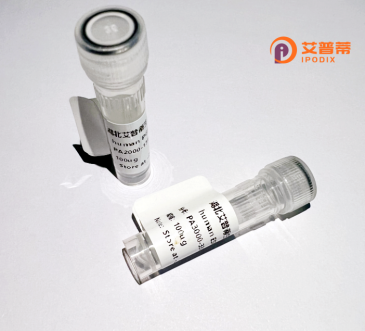
| 纯度 | >90%SDS-PAGE. |
| 种属 | Human |
| 靶点 | MTM1 |
| Uniprot No | Q13496 |
| 内毒素 | < 0.01EU/μg |
| 表达宿主 | E.coli |
| 表达区间 | 1-603 aa |
| 活性数据 | MASASTSKYNSHSLENESIKRTSRDGVNRDLTEAVPRLPGETLITDKEVIYICPFNGPIKGRVYITNYRLYLRSLETDSSLILDVPLGVISRIEKMGGATSRGENSYGLDITCKDMRNLRFALKQEGHSRRDMFEILTRYAFPLAHSLPLFAFLNEEKFNVDGWTVYNPVEEYRRQGLPNHHWRITFINKCYELCDTYPALLVVPYRASDDDLRRVATFRSRNRIPVLSWIHPENKTVIVRCSQPLVGMSGKRNKDDEKYLDVIRETNKQISKLTIYDARPSVNAVANKATGGGYESDDAYHNAELFFLDIHNIHVMRESLKKVKDIVYPNVEESHWLSSLESTHWLEHIKLVLTGAIQVADKVSSGKSSVLVHCSDGWDRTAQLTSLAMLMLDSFYRSIEGFEILVQKEWISFGHKFASRIGHGDKNHTDADRSPIFLQFIDCVWQMSKQFPTAFEFNEQFLIIILDHLYSCRFGTFLFNCESARERQKVTERTVSLWSLINSNKEKFKNPFYTKEINRVLYPVASMRHLELWVNYYIRWNPRIKQQQPNPVEQRYMELLALRDEYIKRLEELQLANSAKLSDPPTSPSSPSQMMPHVQTHF |
| 分子量 | 71.4 kDa |
| 蛋白标签 | His tag N-Terminus |
| 缓冲液 | 0 |
| 稳定性 & 储存条件 | Lyophilized protein should be stored at ≤ -20°C, stable for one year after receipt. Reconstituted protein solution can be stored at 2-8°C for 2-7 days. Aliquots of reconstituted samples are stable at ≤ -20°C for 3 months. |
| 复溶 | Always centrifuge tubes before opening.Do not mix by vortex or pipetting. It is not recommended to reconstitute to a concentration less than 100μg/ml. Dissolve the lyophilized protein in distilled water. Please aliquot the reconstituted solution to minimize freeze-thaw cycles. |
以下是关于重组人MTM1蛋白的3篇参考文献,按您的需求整理如下:
---
1. **文献名称**: "Functional characterization of myotubularin-related protein MTM1 in muscle homeostasis"
**作者**: Buj-Bello A., et al.
**摘要**: 本研究通过重组表达MTM1蛋白,揭示其在肌肉细胞中的磷脂磷酸酶活性,证实其通过调控磷脂代谢维持肌管结构的完整性。实验表明,MTM1突变导致X连锁中央核肌病的分子机制与其磷脂酶功能丧失有关。
---
2. **文献名称**: "Recombinant MTM1 rescues disease phenotype in a cellular model of myotubular myopathy"
**作者**: Laporte J., et al.
**摘要**: 利用哺乳动物细胞系统表达重组人MTM1蛋白,发现其能恢复患者来源细胞中异常的肌管形态和溶酶体功能,验证了MTM1在疾病治疗中的潜在应用价值。研究为基因治疗提供了体外实验依据。
---
3. **文献名称**: "Structural and functional analysis of the myotubularin domain of MTM1"
**作者**: Tsujita K., et al.
**摘要**: 通过晶体结构解析和体外酶活实验,阐明MTM1蛋白催化结构域的关键活性位点及其底物特异性。研究证明重组MTM1蛋白的磷酸酶活性依赖其保守的胱氨酸残基,为药物靶点设计奠定基础。
---
如有其他需求,可进一步补充具体年份或期刊信息!
Recombinant human myotubularin 1 (MTM1) protein is a critical enzyme encoded by the *MTM1* gene, primarily expressed in skeletal and cardiac muscles. As a member of the myotubularin family, it functions as a lipid phosphatase that specifically dephosphorylates phosphatidylinositol 3-phosphate (PI3P) and phosphatidylinositol 3.5-bisphosphate (PI(3.5)P2), regulating endosomal trafficking, autophagy, and cytoskeletal dynamics. Mutations in *MTM1* cause X-linked myotubular myopathy (XLMTM), a severe congenital neuromuscular disorder characterized by muscle weakness, respiratory insufficiency, and delayed motor development. XLMTM pathology is linked to defective skeletal muscle maturation and impaired excitation-contraction coupling. Recombinant MTM1 protein is produced via heterologous expression systems (e.g., mammalian cells or bacteria) for functional studies, drug screening, or therapeutic exploration. Its structural domains, including the PH-GRAM membrane-binding motif and protein tyrosine phosphatase (PTP) catalytic site, are essential for lipid substrate recognition and enzymatic activity. Current research focuses on understanding MTM1's interactome, restoring its activity in disease models, and developing AAV-based gene therapies. Challenges include achieving proper post-translational modifications and ensuring stable protein delivery *in vivo*. Recombinant MTM1 serves as a vital tool for elucidating molecular mechanisms of myotubularin-related diseases and advancing targeted therapies.
×